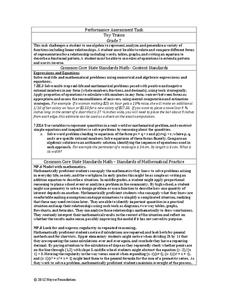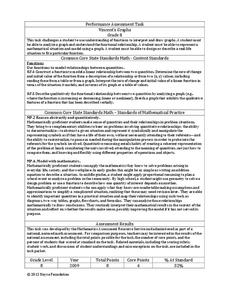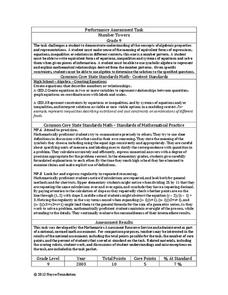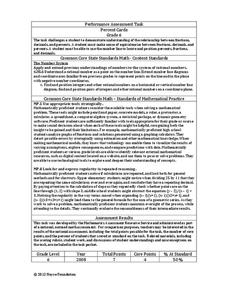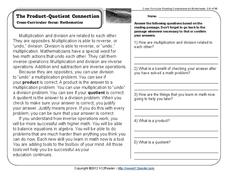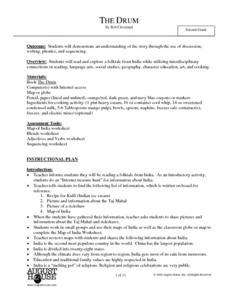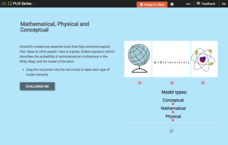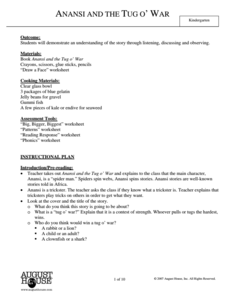Curated OER
Number Stories 1: Student-generated Checklist
Students explore creating a self-assessment tool in a model classroom. Through the use of a video, students are observed engaging in peer assessment activities to generate a checklist. Students discuss the use of strategies a teacher can...
Curated OER
Plants and Animals: Alike and Not Alike
After reading an informative paragraph that outlines some of the differences between plants and animals, fifth graders attempt to correctly categorize 12 words in a word bank. They must put them in the plant, or animal category. This...
Noyce Foundation
Parallelogram
Parallelograms are pairs of triangles all the way around. Pupils measure to determine the area and perimeter of a parallelogram. They then find the area of the tirangles formed by drawing a diagonal of the parallelogram and compare their...
Inside Mathematics
Graphs (2006)
When told to describe a line, do your pupils list its color, length, and which side is high or low? Use a worksheet that engages scholars to properly label line graphs. It then requests two applied reasoning answers.
Inside Mathematics
Quadratic (2009)
Functions require an input in order to get an output, which explains why the answer always has at least two parts. After only three multi-part questions, the teacher can analyze pupils' strengths and weaknesses when it comes to quadratic...
Inside Mathematics
Hexagons
Scholars find a pattern from a geometric sequence and write the formula for extending it. The worksheet includes a table to complete plus four analysis questions. It concludes with instructional implications for the teacher.
Noyce Foundation
Toy Trains
Scholars identify and continue the numerical pattern for the number of wheels on a train. Using the established pattern and its inverse, they determine whether a number of wheels is possible. Pupils finish by developing an algebraic...
Inside Mathematics
Vencent's Graphs
I like algebra, but graphing is where I draw the line! Worksheet includes three multiple-part questions on interpreting and drawing line graphs. It focuses on the abstract where neither axis has numbers written in, though both are...
Inside Mathematics
Marble Game
Pupils determine the theoretical probability of winning a game of marbles. Individuals compare the theoretical probability to experimental probability for the same game. They continue on to compare two different probability games.
Inside Mathematics
Expressions
Strive to think outside of the quadrilateral parallelogram. Worksheet includes two problems applying prior knowledge of area and perimeter to parallelograms and trapezoids. The focus is on finding and utilizing the proper formula and...
Inside Mathematics
Number Towers
Number towers use addition or multiplication to ensure each level is equal. While this is common in factoring, it is often not used with algebraic equations. Solving these six questions relies on problem solving skills and being able to...
Noyce Foundation
Percent Cards
Explore different representations of numbers. Scholars convert between fractions, decimals, and percents, and then use these conversions to plot the values on a horizontal number line.
Curated OER
Creating Fractals
Students solve problems using fractals. In this geometry lesson, students identify properties of fractals. They find patterns in their surroundings and relate it to the real world and math.
K12 Reader
The Product-Quotient Connection
How are multiplication and division connected? Read a passage about inverse operations to find out how you can use products and quotients to check your work when completing an equation from the opposite operation.
Curated OER
Finding PI
Students select and use appropriate operations, methods and tools to compute or estimate using whole numbers. They develop and use formulas for determining the circumference and area of circles. Students determine and describe the...
Curated OER
Measuring Up To Standards
Fourth graders use Unifix cubes to estimate standard measurements of length, weight, and capacity. After practicing, 4th graders complete an individual assessment by the teacher where they are asked questions about measurement and...
August House
The Drum
Take a journey to India with a read aloud of The Drum: A Folktale from India by Rob Cleveland. Make connections to the story's theme by building and practicing drums, role playing story characters, and practicing skills in phonics, math,...
CK-12 Foundation
Modeling: Mathematical, Physical and Conceptual
Scientific models help explain ideas and concepts to non-experts. The online activity covers conceptual, mathematical, and physical models. Through four multiple-choice questions and three discussion questions, scholars gain a deeper...
Physics Classroom
Electric Field Intensity
Learning about electrostatics can be pretty intense! Physics fanatics explore the factors that affect electric field intensity using an interactive from the Static Electricity series. Learners work to complete data tables that relate...
August House
The Ogre Bully
English language arts, math, science, dramatic arts, and cooking; this lesson plan has it all! In this multidisciplinary resource, your scholars will take part in a read aloud of The Ogre Bully by A.B. Hoffmire and have a grand...
August House
Why Koala Has a Stumpy Tail
Learn about the animals of Australia with a language arts lesson about an Australian folktale called, Why Koala Has a Stumpy Tail. After reading the story as a class, kids discuss events and characters from the book, retell the story to...
August House
Anansi and the Tug o' War
Combine art, math, language arts, drama, and delicious Jell-o with a instructional activity based on the African folktale Anansi and the Tug o' War. Kids make predictions and discuss plot points of the story before joining in...
K5 Learning
The Fairy Tree
Read about the ways a beloved pet can help a girl meet her true love with a short fairy tale. As fifth graders read the passage, they note their inferences and answer four comprehension questions to demonstrate their understanding.
CK-12 Foundation
Evaluation of Square Roots
Think outside the box and use an engaging, interactive app that shows the relationship between square roots and squares using an actual square. Pupils find that moving a slider increases the side length of a square and its associated area.








